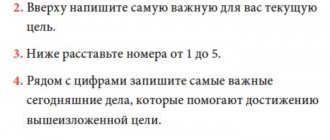Why do people steal? This is the story of a woman who recognized herself at a free lecture on system-vector psychology. I recognized myself as a girl who had been beaten in childhood and had the skin vector. For the first time, the reason for such actions was revealed to her. Yes, I'm a thief. When did you steal for the first time? I don’t remember exactly, probably in kindergarten. And almost all the children steal there. At school, I stole cosmetics from my friends, stole nail polishes and lipsticks. And when they told me how to take money out of pockets on public transport, I tried that too... I didn’t get much money out, but I managed to get a couple of monthly passes.
Sometimes my friend and I stole chewing gum, cosmetics, and other small things from stalls.
What is kleptomania
Kleptomania is a serious mental disorder called Pathological stealing [kleptomania], in which people cannot control the spontaneous desire to steal unnecessary objects.
They do this not for their own benefit, but obeying impulses. They usually steal from large Kleptomania stores, less often from acquaintances and friends. Stolen items are most often not used. Sometimes they even return them, give them to someone, or hide them. A person with this disorder knows that he can harm himself and upset loved ones. But that doesn't help him restrain himself. Many live with a feeling of shame and are afraid to seek mental health help.
The condition Kleptomania occurs in 0.3–0.6% of people. Most often, the disorder is found in women. This information is provided by the Diagnostic and Statistical Manual of Mental Disorders (DSM-5).
Kleptomaniacs often suffer from other mental disorders Kleptomania: diagnosis and treatment options. For example, from anxiety or an eating disorder. Some begin to use psychoactive substances.
Where does kleptomania come from?
The exact causes of the disorder are still unknown. But researchers have several suggestions for Kleptomania.
Disturbances in the functioning of serotonin
This neurotransmitter helps control mood and emotions. Low levels of the substance are found in people prone to impulsive behavior.
Addictive disorders
Stealing can trigger the release of dopamine. How Does Dopamine Affect the Body? . This neurotransmitter causes pleasant sensations. Therefore, people with the disorder look for situations that will lead them to the state they like.
Malfunction of opioid receptors
Their main function is the regulation of pain. The urge to take any action is also controlled by this system. An imbalance can lead to a person being unable to resist momentary desires that are caused by impulses.
Why do people steal? Realization of the loser complex
People with the skin vector, born breadwinners, and in their ancient roots simply thieves, must develop into their opposite - legislators, engineers, military men, athletes and businessmen. But under certain circumstances and due to the lack of proper upbringing in the family, they may remain in their undeveloped state. If children with the skin vector are beaten or verbally humiliated, they gradually get used to such stress and begin to release endorphins, receiving punishment, then realizing a masochistic scenario or loser complex for the rest of their lives.
How to recognize kleptomania
Let us repeat: the main symptom of the disorder is the inability to control the desire to steal. But the Diagnostic and Statistical Manual of Mental Disorders (DSM-5) identifies four more criteria for Kleptomania of this disorder:
- feeling of tension before theft;
- feeling of relief or satisfaction during it;
- a person does not steal because of hallucinations, revenge or anger;
- episodes of theft are not caused by other disorders, such as dissocial or behavioral disorders.
Sometimes kleptomaniacs experience the feeling of Kleptomania guilt after stealing, but in almost everyone the desire to steal appears again.
Theft
The opportunity to steal creates a thief.
Francis Bacon
From childhood, a person is diligently implanted in his head the idea that stealing is bad? Moreover, theft is also punished, both in childhood and in the adult world, so that a person does not engage in it. And people still steal! They have been stealing, stealing, and apparently will continue to steal as long as they remain human. And why? But because a person is prone to theft from birth, just as he is prone to deception, violence, betrayal, cowardice, aggression, passion and other things that usually need to be controlled so that we can get along with each other. We cannot do everything we want, otherwise life in society will become impossible. But not everyone can control themselves and not everyone wants it. Because it is easier for us to steal than not to steal. And sometimes you want to do this when the temptation to take someone else’s is too great. Let's see what follows from this and what to do about it.
What is theft
Theft is the appropriation of someone else's property against the will of its owner. And from a psychological point of view, theft can be called a person’s realization of his desire to take possession of someone else’s property, someone else’s property, contrary to the wishes of the one who owns this property. After all, it’s one thing when there are thoughts in the head, both conscious of a person and not, on which such a desire depends, which create this desire. Well, you never know what we might want, sometimes a person himself is amazed at his own desires. But it’s a completely different matter to realize your desire, and also understanding that it is condemned and punished by society. Theft appears when a person gives free rein to his desires, and not when he wants to steal something or even just admits such a thought.
You can't steal
We are constantly taught this, both in childhood and in the adult world. And those who do not accept or understand this are usually punished. But no matter how much you tell a person that it is impossible to steal, if he sees cases where theft goes unpunished, for a number of reasons, he will not believe this “impossibility”. But such cases always exist, and we know it. It turns out that some people cannot steal, but others can still steal. Some people are severely punished for theft, and not very serious ones, while others get out in public this way. Seeing such injustice, any reasonable person will draw the appropriate conclusion from this, according to which it is impossible not to steal, it is impossible to steal incorrectly, for example, from certain people or for every little thing. It is necessary to steal in such a way that it is impossible to find fault or steal from those who cannot do anything about it or protect themselves in any way. Or you have to steal so much that you can share it with whoever you need and get away with it. And this is quite adequate logic. As long as such double standards exist in society, theft as a phenomenon will continue not only to exist, but also to improve as people find more and more cunning ways to appropriate other people's property.
Punishments won't help
If you simply punish people for theft, then this will not give a serious positive result. This is no way to deal with theft. If you notice, no matter how much you punish for this matter and no matter how much you punish, even if you cut off your hands, as was the case in some countries, people will still continue to steal. Not everything and not always, but when there is an opportunity to steal, when the temptation to appropriate someone else’s property is too great, rarely can anyone resist it. That's why people steal. And all because the craving for pleasure that a person can get from stealing something valuable often overpowers the fear of the consequences of committing such an act. Simply put, the thirst for easy and quick profit exceeds the influence of the instinct of self-preservation in its strength. That’s why punishments don’t work and don’t give the desired effect. But what helps will be discussed below. But for now, let's look at theft as a disease, for that is what it is.
Stealing is a disease
Yes exactly. Theft can be compared to alcoholism or drug addiction, when a person, having given free rein to this innate desire to profit at someone else’s expense, becomes so accustomed to appropriating someone else’s property that he simply cannot cope with it, no matter what you do with him. He loses control over himself and becomes addicted to the pleasure derived from quick and easy money. After all, what could be simpler than just taking and stealing someone else’s property? It is much easier than earning money and safer than taking it away. A person always becomes dependent on any pleasure, and this is exactly what we are talking about here. And since we began to consider the same drug addiction and alcoholism a disease, then we should treat theft the same way. In general, any addiction to any type of pleasure in which a person loses control over himself is a disease. A sick person is rarely able to help himself. Therefore, he needs outside help. Another thing is what it will be like, who will provide it to him and how. You can punish a person for this weakness, which does not always help, and sometimes does not help at all. Or you can teach him to live without stealing. Which is more difficult, but much more reliable. But the main thing is to remember that a thief does not control himself when he succumbs to the temptation to steal something, when he salivates at the sight of a wonderful opportunity to appropriate something for himself. Therefore, it is pointless to reason with and intimidate him at such moments.
A thief is a hunter
They also become thieves because of their convictions. More precisely, the philosophy of theft can perfectly complement the innate inclination towards this activity. It's an honor to be a thief. In any case, according to some people, usually professional and ideological thieves. Because a thief is a hunter who, through courage, ingenuity, determination, perseverance and other strong qualities, thanks to which he can afford to encroach on someone else’s property, gets himself what he needs. If you tell a thief that you are an honest and decent person who does not take someone else’s property, then he will tell you that you are just a coward and a lazy person who is afraid to go against social rules in order to get the valuables he needs. Honesty in the understanding of a thief is a consequence of cowardice, laziness and, in general, weakness. Anyone who doesn't steal is simply afraid to steal. And at the same time he hides behind decency. A thief, if you tell him that stealing is bad, will ask you: “Is it better to work your whole life for someone who is no better than thieves, because he appropriates the result of someone else’s labor, that is, yours, and lives at your expense?” The rules are different, but the result is the same. In our society, some people live at the expense of others, and how it all is arranged does not matter. At least according to the thieves. Why then be honest if the rules of the game in this world are themselves dishonest, and then be proud of your honesty, which has become a reflection of cowardice and weakness, as well as useless and neglected poverty? A thief will not understand a person who does not steal only because he considers it wrong.
What's better than theft
The thieves themselves, both professional and those who steal something from somewhere from time to time, do not understand much themselves. In particular, they do not understand that there are things that are better than theft. And what, in terms of the balance between efficiency and security, could be better than theft? Two things are competent fraud and trading. Competent fraud is when a fraudster, within the framework of the law, gets people to give him some valuables themselves, and in return receive much less or nothing at all. But at the same time, no one will be indignant, everyone will be happy. You don’t take anything from anyone, people bring everything to you themselves. And everything is within the law. And at the same time everyone is happy. Well, or in any case, people deceived in this way do not express obvious dissatisfaction and hostility. Another thing is that the laws may not be perfect, but these are not questions for the fraudster. A scammer manipulates people to gain possession of something. He does not use violence for this, like the same bandits, he does not take anything secretly, against the will of people, as thieves do, he simply penetrates the heads and souls of people in order to induce them to take the actions he needs.
And trade is an absolutely legal, profitable, and not immoral way of acquiring necessary values. But, of course, it is also more complex. A merchant needs to do more work than the same thief in order to acquire any valuables that he, in fact, will earn. But he has nothing to worry about, no one will punish him for such activities. And the benefits can be very big. After all, you can trade anything, a person here is not tied to anything. The main thing in such work is to be able to communicate, interact, and negotiate with people. Trading is much better than doing some work while working for someone else, because the trader is free to choose what, where, when, to whom and for what to sell. His material well-being depends on his ability to work with people. And no one suffers from this. Well, of course, if the person does not sell drugs and other rubbish. Rather, on the contrary, people will benefit from the work of a merchant, since he will help them acquire the necessary things, help them make mutually beneficial exchanges with each other, acting as an intermediary.
What could be worse than theft? Worse, perhaps, is robbery in its various manifestations. Let's see what the difference between one and the other is.
Theft and robbery
Theft should not be confused with robbery. I often notice how people confuse one with the other. But these are two different types of activities. Theft is a non-violent way of taking possession of someone else's property, and robbery, accordingly, is violent. A thief appropriates someone else's property without resorting to violence, without forcing or forcing anyone to give him something. He does everything quietly. A burglar uses violence or threats of violence to take possession of someone else's property. That is, robbery implies some kind of physical or psychological impact on the person, the people whose property the robber is going to take possession of. Thieves do not do this; they appropriate other people's property without influencing its owner. That's the difference. Therefore, when in some cases, whether by legal or illegal means, people are forced to give up their resources, against their wishes, this is not theft, but robbery.
How to deal with theft
To deal with theft, of course, punishment for this act must be applied. It is also clear that the punishment for theft should be severe, otherwise people will not be afraid of it and it will be more difficult for them to give up their desire to appropriate other people's property. But this measure alone will not do. Even if the punishment is very severe, it will not completely solve the problem of theft. That is why people steal and still steal when they have the opportunity. Therefore, the approach to combating theft should be more diverse. The most important thing to do is not to create opportunities for people to steal something. Of course, this is not always easy to do, and sometimes it is impossible. And yet, the more obstacles there are to stealing something from a person, the lower the likelihood that he will do it.
There is no need to tempt people by creating conditions in which their hand can reach out to someone else’s. There is no possibility of stealing, and there will be no theft itself. And if society wants to fight the cause of theft, and not its consequence, punishing people, in essence, for their weakness, for the fact that they could not resist the temptation to steal something and took advantage of the opportunity given to them, then we need to think about how to deprive them of this opportunity, how to protect them from such temptation. Because even if there is a severe punishment for theft, a person will still steal if he cannot control himself. But people often cannot, because various kinds of weaknesses constantly take possession of us, and we succumb to their influence. But taking someone else’s, taking what is “bad” is still a weakness. Or, what’s even worse, when a person doesn’t understand at all why it’s wrong to steal, even if you clearly explain it to him and show him with examples of other people what happens. Understanding something is not as easy as it seems. Sometimes, to understand something, you have to experience it. Yes, and even this can be forgotten. We must understand that not every person is able to connect cause and effect so well as not to do something for which he may suffer. It’s like with children, for whom it is useless to tell them not to do something, for example, not to take some things. It's best to hide anything they shouldn't take from them, whether it's medicine that young children might eat or money that teenagers might steal. This is the only thing that will help. Therefore, I repeat, it is very important to deprive people of the opportunity to steal, then they will not steal.
Another way to combat theft is to create conditions where people think they are being watched. The psychology of a thief differs from, say, the psychology of a robber in that such a person likes to do everything quietly, unnoticed by others. And when you are being watched, it is more difficult to steal, one might say impossible. And therefore, people will begin to do this less and less often, or even stop altogether, when, for example, they know that there are security cameras everywhere and these cameras show everyone everything. The point is not that people will be afraid of punishment or reproach, condemnation, because someone will know that they are stealing, this is a separate point. I'm talking about the discomfort caused by the feeling of being watched, watched. This is a purely psychological moment. A thief, I repeat, likes to act quietly; it is very important for him that no one sees or knows that he has stolen something. Although not all thieves are afraid of being watched, it can stop many from stealing if they know that they are being monitored.
A decent quality of life is also a good way to combat theft. When a person lives normally, does not live in luxury, but has everything necessary for life, then he has much less grounds for appropriating other people’s values. Give people everything they need to live and they will not be drawn to theft. Well, in any case, the desire to do this will greatly weaken. Of course, I don’t think that if you give a person everything he wants, everything he needs, then he won’t steal. It is not right. You definitely don’t need to give everything, and you don’t need to give it for free. Firstly, because no matter how much you give a person, he will still want more. And secondly, if he easily and quickly gets everything he needs for life, he will lose his motivation to work. And why does society need idlers, because of whom the quality of life will decrease. No, of course, people must work, must contribute to the creation of public goods. But at the same time, get a decent reward. A normal quality of life, not the kind when a person is forced to survive, may not completely deprive him of the desire to steal, but it will deprive him of the need to do it. This problem is not difficult to solve. You just need to moderate the appetites of some people, on whom life in society depends.
Well, the last, perhaps the most important way to combat theft is to create and develop a culture in which not so much theft will be condemned as honesty will be praised, exalted and rewarded. Society should encourage honest, decent people, that is, those who do not steal, so that every person can see what he will get from not succumbing to weakness and not stealing anything. In any normal culture, theft is condemned, we know that. Even in many subcultures, stealing is viewed negatively. But at the same time, no attention is paid to those people who do not steal, they are not extolled, not encouraged, do not appear in news reports, attracting public attention, they are not valued in any way just for the fact that they do not steal. He takes this for granted. And we should at least praise him for this. Because many people who don’t steal anything live, let’s say, quite modestly. Some thieves who steal beautifully and a lot, so that you won’t get to the bottom of it and you won’t punish them, because they pay off the punishment, get a lot of things and live beautifully. In addition to a beautiful and well-fed life, they receive recognition, respect, they receive a lot of attention, as strong, successful individuals, as some kind of heroes. With stolen funds, they can afford to create an image of people who supposedly earned everything honestly, thanks to their dedicated work. But actually it is not. And people who don’t steal or, let’s say, who don’t know how to steal, see and understand this. And they are offended, not only because they do not have something that beautifully stealing people have, but also because their decency and honesty are not recognized and appreciated.
Now, if this problem is solved at the level of mass culture, then this will also reduce people’s desire to steal. Give respect to those who do not appropriate other people's property, they deserve it. In the meantime, I can tell you that when communicating with people, I learn that they feel like losers, losers, weaklings, worthless individuals because they live poorly, are not respected, do not receive recognition, although they never receive anything They didn't steal anything serious. And it hurts them. Such a person, in a state of despair, can not only decide to steal, a stupid, unnecessary one, if life gives him such an opportunity, but also, if he has already lived most of his life, then he will begin to teach younger people that honesty is nothing in this world not worth it. It gives nothing to a person, no one will respect you for it. As a result, young people who have received such instructions and seeing evidence of their truth in the example of successful thieves will conclude for themselves that it is better to take risks and steal in order to live well and beautifully than to live honestly. So, a lot depends on the culture that we create and support. Our actions depend on it. Culture can help us curb our weaknesses, or it can condone their manifestation.
This is the approach to theft that should be taken, from my point of view, if society wants to successfully combat this matter.
How is kleptomania treated?
It is almost impossible to cope with the disorder on your own. If you do not undergo special therapy, the deviation will be tormented constantly. But fear and embarrassment often prevent kleptomaniacs from seeking help. When an adult is still ready to admit the problem, he needs to make an appointment with a psychotherapist.
If you notice How To Help a Friend With Kleptomania symptoms of kleptomania in someone close to you, first try to talk to them tactfully. But keep in mind, he may deny the presence of a deviation. Sometimes, out of embarrassment, people refuse to discuss the topic altogether.
Kleptomaniacs are often forced to turn to a psychotherapist by other problems Kleptomania: Emerging therapies target mood, impulsive behavior, which spoil the quality of life. For example, the already mentioned substance addiction, eating disorder or anxiety.
There are several treatments for Kleptomania. The doctor may combine them.
Medicines
Let's say right away that there are no drugs for kleptomania. But some patients are prescribed Kleptomania: Management and Treatment antidepressants, which sometimes help curb the urge to steal.
A specialist may also prescribe opioid receptor antagonists. They reduce the pleasure and attraction to theft.
Psychotherapy
This is the main treatment method. His goal with Kleptomania: Management and Treatment is to help a person understand why they have no impulse control. During the sessions, patients learn to control the urge to steal. Those who have depression and anxiety get rid of them too.
During cognitive behavioral therapy for Kleptomania, the doctor may recommend several techniques. For example, if you intend to steal, hold your breath until you feel disgust from the idea itself. Another way that helps some people is to imagine themselves stealing and then visualize the unpleasant consequences.
How to help yourself
These Kleptomania tips can improve the effect of professional treatment, but do not replace it.
- Stick to your treatment plan. Take your medications as scheduled and do not miss therapy sessions.
- Try to identify triggers. These are thoughts, feelings, situations that push you to want to steal.
- Substance addiction or depression can trigger cycles of theft. Consult your doctors to get rid of these problems.
- Explore where you can redirect your desire to steal. Sometimes exercise, going to a movie or a concert helps.
- Try techniques that help you relax. For example, yoga, meditation, tai chi.
- Focus on the goal. Treatment can be long, and this helps to maintain motivation.
Why do people steal? Vicious circles
A skin child, experiencing extreme stress and not receiving moral support and a sense of security in the family, unconsciously relieves stress by stealing. Being caught and punished with a beating, he experiences even more stress and steals again to calm down, feeling satisfaction. But he is caught again and punished with prejudice...
This creates a vicious circle where the child gets used to relieving stress by stealing. Nothing can push him to develop, because he now knows how to quickly get his share of pleasure. Of course he does this unconsciously. And then all his life he remains an unripe fruit, trying to take something else’s. Is it possible to change as an adult? Yes it is possible. Having recognized himself, realizing the unconscious reasons for his behavior, a person can once and for all change the scenario of his life, acting consciously. This is what happens at the training on system-vector psychology by Yuri Burlan. Author: Svetlana Chueva, psychologist











